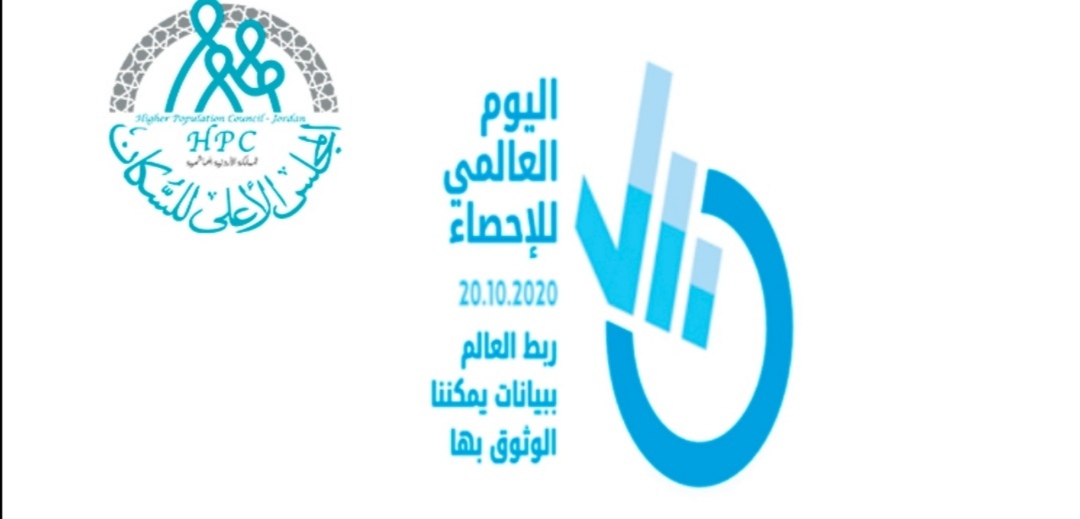

Jordan and the rest of the world mark today, October 20, the World Statistics Day, which is celebrated every five years. The theme for this year is “Connecting the world with data we can trust”, to reinforce the role of official high-quality statistical data in facilitating studies that comprehensively inform decision-makers at various levels and as an authoritative reference that captures demographical and socioeconomic developments and progress towards achieving national goals, plans and programs.
On this occasion, HPC Secretary General, noted in a special press release that in these unprecedented times, covid-19 has shown that during a crisis such as this, governments need more than ever before reliable and timely data to make decisions to mitigate damages and support citizens. Amawi explained that due to the serious impact of Covid-19 on our interconnected world, the decisions made will have long-term consequences into the future and will impact people in every region and every community.
Amawi stressed that we should reflect on how decision makers and policy-makers can utilize the wealth of pandemic-related data, how the pandemic has changed our world from a statistical perspective, and what does the department of statistics need more than the others.
Amawi noted that the information on Covid-19 impact is evident in many areas, including the socioeconomic and statistical impact as well as the social cost. Amawi added that national statistics systems are facing tremendous challenges due to the pandemic as demand for data has become urgent more than ever before to direct critical interventions to save lives, restart the economy, and address the long-term impact of the pandemic. Amawi pointed out that the Department of Statistics should play a vital role in producing reliable and timely data to help the government respond effectively to the socioeconomic and health impact of the pandemic. Access to data on Covid-19 impact is a significant challenge that must be addressed to help track readiness and responsiveness against key indicators such as the capacity of the healthcare system as well as the socioeconomic responsiveness, infrastructure.
The Department of Statistics, like its counterparts across the world, suffered due to the lockdown, which made face-to-face data collection difficult. While staff have been forced to work remotely sometimes, has there been adequate ICT equipment and infrastructure to support them? Amawi explained that these issues reaffirm the need for more decisive investments in digital technology to facilitate remote work and training, and the collection, disaggregation and storage of data during the pandemic. Statistical production methods should be reconsidered to move away from traditional methods to alternative data management sources and remote data collection methods. There is also a need for smart investments as well as adequate coordination of national statistical methods to respond to the pandemic, and secure the appropriate infrastructre to enable a rapid and effective switch to remote operations to address the challenges.
Amawi said that many countries around the world have adopted modern, innovative and diverse methods for collecting and presenting Covid-19 related data and applied different hypotheses and scenarios for dealing with the pandemic. The Higher Population Council developed hypotheses and scenarios on the consequences of Covid-19 at the national level, and its impact on different population groups, and presented them to the Jordanian government to help implement best practices to determine projections about the infection rate and spread and the comprehensiveness of social protection.
Moreover, HPC stated that it relies primarily on data and studies from the Department of Statistics, information from concerned institutions, as well as on the data and studies it produces to support the formulation of population policies, programs and plans. HPC also benefits from DOS to determine estimates, projections, census data, and sample surveys to help realistically learn about the society and the prevailing trends in it, demographically, economically, socially, etc.
Commenting on the key challenges facing national statistics, HPC stressed the importance of producing additional unconventional data on (human development, poverty, human rights, women’s studies), strengthening cooperation, coordination and interaction with data users, and engaging data users in identifying their needs for data and integrating them into government priorities. HPC also pointed out that the lack of a national administrative register of the population residing in Jordan (Jordanians and non-Jordanians) and Jordanians residing abroad is the most prominent challenge facing the formulation of sound plans and policies. This register, if available, will save the government the high costs associated with conducting censuses and sample surveys.
Other challenges noted by HPC include the lack of statistical awareness among many citizens and residents, the disregard, sometimes, for the views and needs of data users in the design of census and survey forms or after the results are published, and the administrative obstacles hindering access to data that is not posted on the DOS website for confidentiality considerations.







